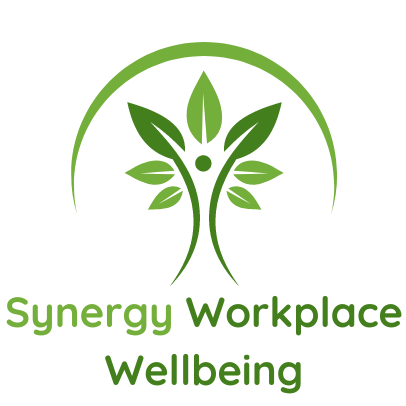
Synergy Workplace Wellbeing
Workplace Wellbeing | Job Mental Health | Workplace Health and Safety | 03 260 7164

Synergy Workplace Wellbeing
Workplace Mental Health and Workplace Health and Safety
03 260 7164
Common Questions Employers and Employees Ask Us
Employer Questions
Q.
What is wellbeing?
A.
Our wellbeing model is formed by Te Whare Tapa Wha (the four cornerstones of health). These include mental/emotional (hinengaro), physical (tinana), spiritual (wairua) and social connection (whahau). All elements are equally important to good health and wellbeing
Q.
Shouldn't our employees expect some stress in their job?
A.
Yes, there is nothing wrong with a reasonable amount of stress, especially if it motivates employees to perform. However, people continuously running at a high level of stress can become overwhelmed if additional stress comes out of the blue, so it is important for each employee to be able to recognise when they are struggling and ask for help.
Q.
What's the difference between mental illness and mental distress?
A.
Mental illness refers to a set of diagnosable symptoms that are consistent with a mental health disorder. Mental distress is usually a temporary state of thoughts and emotions that has a negative impact on a person. If not addressed, mental distress can lead to a serious mental health disorder.
Q.
Why should business owners and managers be concerned about employees' personal problems?
A.
As much as employees try not to allow personal problems affect their work, being human means it is not easy to compartmentalise life to that degree. Your employees may not know how to deal with personal problems or who to contact for help, so a robust workplace wellbeing programme will help them manage all areas of their life.
And of course, dealing with personal problems helps employees get back to full performance and productivity
Q.
How do I support an employee who tells me they are struggling?
A.
The best approach is to listen without judgment and avoid problem solving.
A Synergy Workplace Wellbeing Educator can tailor a wellbeing recovery plan for the employee and give you the resources you need to support them in the workplace. We recommend against digging too deep into the issue with your employee, much the same as your business would advise clients against attempting the work that you specialise in.
Q.
What resources can we get for our employees?
A.
The standard 2 hour Synergy Workplace Wellbeing seminar includes a wellbeing toolkit that employees can use to figure out and record what contributes to them being well and how to identify when they are starting to experience undue stress or challenges to their mental health and wellbeing.
We can also provide a range of helpful resources with our bespoke programmes, for business owners, managers and employees.
Q.
How can I tell if my employees are struggling with their mental health?
A.
The key is to get to know your employees really well, and then you will be able to spot changes in their personality or behaviour. Although not all changes indicate a mental health problem.
A Synergy Workplace Wellbeing Educator can teach you some tips to give you confidence to speak to any employees your are concerned about.
Employee Questions
Q.
Is it really true that 1 in 5 people experience a mental health or substance use problem?
A.
Yes. That includes people with severe mental illness or addiction who needs hospitalised as well as people who put on a brave face and struggle through their day. And everyone in between.
If your business employs 20 people, statistically 4 of them will be struggling on any given day, probably with a brave face.
Q.
Shouldn't I expect some stress in my job?
A.
Yes, there is nothing wrong with a reasonable amount of stress, especially if it motivates employees to perform. However, people continuously running at a high level of stress can become overwhelmed if additional stress comes out of the blue, so it is important for each employee to be able to recognise when they are struggling and ask for help.
Q.
Why would my employer be concerned about my personal problems?
A.
Your employer has invested a lot of time and money into you, so it is in their best interest to support you with any problems that are affecting your work. Happy, healthy workers are more productive.
Q.
What does Synergy Workplace Wellbeing actually do
A.
We have a wellbeing toolkit you can use to figure out and record what contributes to your wellbeing and how to identify when you are starting to experience undue stress or challenges to mental health and wellbeing. We can come to your workplace and run a 2 hour seminar for staff groups, and provide individual support as well.
We can also provide a range of helpful resources with our bespoke programmes, for business owners, managers and employees.
Q.
How do I tell my employer I am having problems with my mental health and wellbeing?
A.
We suggest you ask your employer to set aside some time to talk about something that has been on your mind. Then tell them straight up how you are feeling. Regardless if your challenge is personal or work-related, it is a good idea to have some possible solutions in mind. Feel free to talk to one of our Wellbeing Educators about some options you can take back to your employer.
Q.
Isn't the formal health system supposed to look after our mental wellbeing?
A.
There are many interventions offered by our local health system, including GPs, counselling and specialist crisis, community and inpatient services. However, there is pressure on all parts of this system, long waiting times, arduous referral processes and strict eligibility criteria. Mental distress can have a significant impact on a person in a very short timeframe. People have become very unwell waiting on services for several weeks.
A Synergy Workplace Wellbeing programme can help you deal with any issues immediately to minimise disruption to your life and obligations. More importantly, you will learn preventive measures so hopefully you won't need the formal system.
Q.
How can I tell if my workmates are struggling with their mental health?
A.
The key is to get to know your workmates really well, and then you will be able to spot changes in their personality or behaviour. Although not all changes indicate a mental health problem.
A Synergy Workplace Wellbeing Educator can teach you some tips to give you confidence to speak to a workmate your are concerned about.
Contact us to find out how we can help your business.
We look forward to working with you to help make positive changes in your workplace.